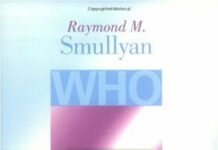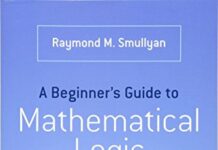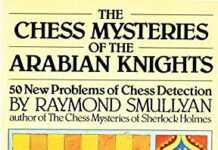
Ebook Info
- Published: 1988
- Number of pages: 272 pages
- Format: PDF
- File Size: 3.53 MB
- Authors: Raymond M. Smullyan
Description
This book provides an introduction to Kurt Godel’s theorems through a collection of puzzles interspersed with an account of symbolic logic. Godel’s argument has been transferred from the formal domain of mathematical systems in an attempt to make its essential ideas more accessible to the general reader. The primary emphasis is on belief systems and how they are related to systems of mathematics. This leads to the subject of possible world semantics which plays a role in computer science and artificial intelligence.
User’s Reviews
Reviews from Amazon users which were colected at the time this book was published on the website:
⭐Easier to digest when read with “Logic for Dummies”.
⭐Fast shipping and great book!
⭐I stumbled on this book by accident, wandering through the Math library at Berkeley when I was an undergrad, and I was immensely glad I read it. In contrast to the many “descriptions” of Godel’s theorems that leave one still wondering what they really are, Smullyan’s book actually guides the reader through the logic. Better yet, it’s done with Smullyan’s enormously fun puzzles! A wonderful book.
⭐This book was recommended (an aeon ago) in my undergraduate philosophy class, with the recommendation that if one will bother to think through each example, then one will become very good at formal logic. Many years later I have found time to do this. So many things can keep me awake at night, idle thoughts, terror at the credit crisis, and so on. Now I read one puzzle from Smullyan, and gently tug my mind back to it if it wanders as I lie in bed. This has been a revolution for me. Either I learn something or I sleep better. This book hits the happy medium between on the one hand an overly formal approach to logic such that it is unsuitable for anything but hard work or formal study and on the other a text that is watered down to the extent of being useless. I do not recommend my particular way of reading this as the only way or the best way, but merely as an example of how it has worked very well for me. The practical benefit of using this book and learning from it is that one can grasp arguments and any problem in them much more rapidly than before, both in work and non-work life. I recommend this book very highly to anyone at any level who is interested in logic, language, problem solving or reasoning.EPICTETUS
⭐In the every day practice of mathematics or viewing the works of others, I have never ran across or derived a self-referential statement of the kind that Goedel used in his proof of the incompleteness theorems. The appearance of these kinds of statements takes place only in the context of mathematical logic, and their construction is is somewhat artificial, involving the use of ‘diagonalization’. It is for this reason that I don’t find the incompleteness theorems in any way troubling for the “truth” of mathematics. If they kept arising in the everyday practice of mathematics, this would lend support to the incompleteness theorems. As such though there is no “empirical” support for them, and until they do arise they can be safely ignored. The results of Goedel have been used to cast doubt on the “foundations” of mathematics and the “strong AI” problem. But they have also been used to support “strong AI”, as it is felt that the existence of self-referential statements are an indication that a machine is conscious. All of these arguments are interesting, but they have yet to help in the practice of mathematics or in the construction of intelligent machines. In fact, too long an emphasis on these results has probably retarded the advancement of artificial intelligence research. The incompleteness theorems though have stimulated research in the field of ‘automatic theorem proving’ and in this respect they can be said to have had some value. This book gives an overview of Goedel’s incompleteness theorems and its corollaries from a “semi-popular” point of view, meaning that readers are expected to have some background in elementary logic as well as philosophy, in order to appreciate the contents. The author is eloquent and enthusiatic throughout the book, and this serves to make the book more palatable for the absolute beginner. It would be unfortunate maybe that readers will begin to doubt the “truth” of mathematics after reading this book, but that doubt could also be viewed as a virtue, in that it would motivate further thinking and research. But again, to this date there has been no self-referential statement that has appeared in the everyday practice of mathematics….that I know of anyway.
Keywords
Free Download Forever Undecided: A Puzzle Guide to Godel in PDF format
Forever Undecided: A Puzzle Guide to Godel PDF Free Download
Download Forever Undecided: A Puzzle Guide to Godel 1988 PDF Free
Forever Undecided: A Puzzle Guide to Godel 1988 PDF Free Download
Download Forever Undecided: A Puzzle Guide to Godel PDF
Free Download Ebook Forever Undecided: A Puzzle Guide to Godel



